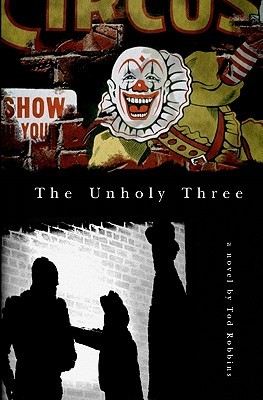 By TOD ROBBINS (BookSurge Publishing; 1917/2008)
By TOD ROBBINS (BookSurge Publishing; 1917/2008)
One of the few novels I’ve read capable of disproving the assertion that truth is stranger than fiction, THE UNHOLY THREE is the twisted story of a trio of circus freaks on a crime and murder spree. Clarence Aaron “Tod” Robbins is best known for the 1928 short story “Spurs,” which inspired Tod Browning’s immortal 1932 film FREAKS (Browning, of course, also loosely adapted THE UNHOLY THREE for film in 1925), evincing an evident fascination with human oddities that attains its fullest expression here.
The Unholy Three consists of Hercules, a giant who provides the body of the trio, Echo, a ventriloquist who supplies the voice, and Tweedledee, a profoundly bitter dwarf who provides the brains. Tweedledee’s dark nature, engendered by years of working as a carnival fixture for the edification of leering slobs, is vividly and disturbingly evoked: “He had been a doll; a plaything for all these vulgar children…And, as he had grown older, the inner workings of this doll had changed…the springs of good had corroded with rust; and soon the green mould of evil covered everything.”
After impulsively attacking a young boy and causing a mini-riot during a freak show performance, the perpetually pissed-off Tweedledee escapes the carnival with Hercules and Echo in tow. Their objective: an all-out war against “normal” society! The trio’s first outrage is the murder of the so-called Human Skeleton of their carnival, who disrespected Tweedledee on the day of his freak-out and pays a steep price for it.
Following this we’re introduced to Hector McDonald, an aspiring writer engaged to the fabulously wealthy Dorothy Arlington. Near the Arlington mansion is a recently opened pet shop run by a very strange old woman with a strong man in her employ, as well as a wide-eyed infant. Hector finds himself drawn to the old woman, who, like her two companions, isn’t quite what “she” appears. If you haven’t already guessed, the strong man is Hercules and the infant is actually Tweedledee, who plans on using his unique disguise to gain access to the Arlingtons’ riches.
Tod Robbins may be largely forgotten nowadays, but he was a first-rate purveyor of dark and bizarre fiction. THE UNHOLY THREE, like much of Robbins’ writing, is dated in many aspects (the florid prose frequently comes off as bloated and overwritten, and the histrionic courtroom climax is ridiculous by any and all modern standards) but overall it holds up quite well, with passages of still-startling nastiness. Furthermore, Robbins takes his loony concept entirely seriously, giving it grade-A treatment with solid characterizations and a narrative that’s downright ingenious in its methodical construction and macabre invention.
